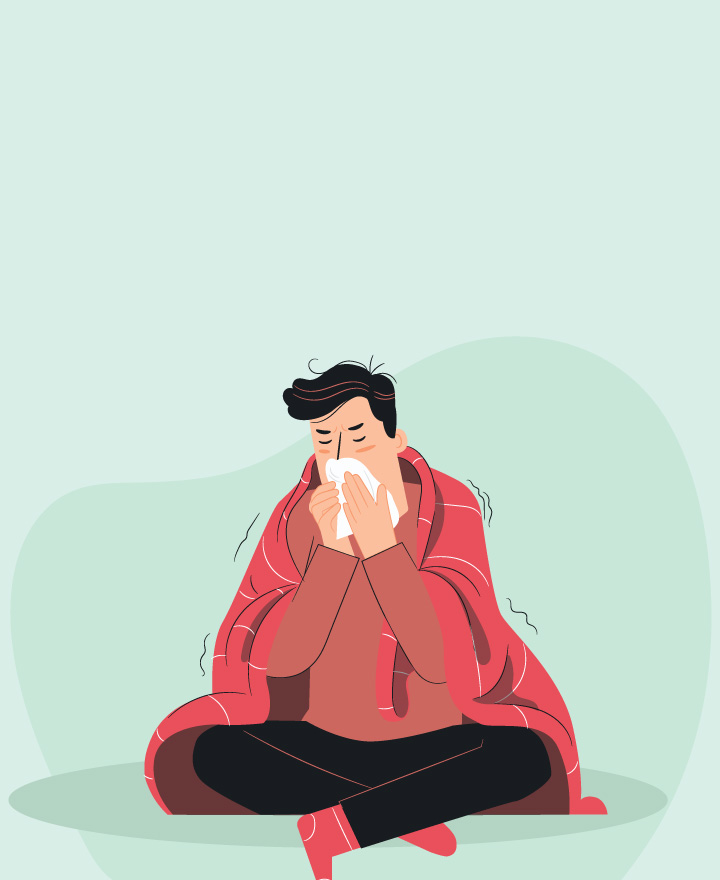

Life Cycle of the Common Cold
The common cold is a mild infection of the upper respiratory tract that has a definite periodicity and which always begins with an incubation period. During the infection, symptoms such as sneezing, runny nose, and headache increase. After four to five days, the condition stabilises, which gradually ends after a week. However, with the appearance of coughing, the treatment process can last up to another week. Read on to understand the life cycle of a common cold to diagnose the infection by the existing stages.
Common Cold Cycle
The life cycle of a cold generally spans 7 to 10 days. The common cold cycle typically starts with a short incubation period after exposure to the virus. This is the time at which the virus actively multiplies, and the person does not yet suspect that he/she is already sick. At the same time, the person feels quite well, without any signs of the infection.
Following the incubation period, the first noticeable signs of the life cycle of a cold begin; these identifiable symptoms are sneezing, a runny nose, and mild throat irritation. This stage can last for a few days, often accompanied by fatigue. This is the peak phase when the cold virus is most active in the body.
After the peak, the cold gradually starts to subside. The congestion might ease, and your energy levels may slowly return. However, during this part of the common cold cycle, symptoms such as coughing or nasal blockage might linger a bit longer, which is typical for the final stages of the life cycle of a cold. These final days mark the body's recovery process, with the immune system gradually getting back to normal.
Conclusion
The common cold cycle is a regular, natural process that we all encounter. By understanding the life cycle of a cold, we can better anticipate how long it will last and what symptoms to expect in each stage. While the duration of each phase can vary slightly from person to person, knowing the typical progression helps us prepare for the journey from onset to recovery.
One of the important components of our overall wellness is also being financially secured. Healthcare emergencies can happen any time, but a good health insurance policy can protect you from such uncertain situations. To know more about Wellness and other health related tips, visit the wellness corner.
Source: healthline.com, medicalnewstoday.com
Disclaimer: This blog provides general information and discussions about health and related subjects. The information and other content provided in this blog, website or in any linked materials are not intended and should not be considered, or used as a substitute for, medical advice, diagnosis or treatment. Kindly contact your Doctor before starting a new medicine or health regime.
Related Articles
Cold and Flu Remedies- Herbs To Keep Your Cold In Check
Summer Cold - Causes, Symptoms and Remedies
10 Signs Of A Weak Immune System
Brain Fever - Symptoms and Causes
Tomato Fever Symptoms - Understanding the Signs
Published on November 14, 2024














 Health Insurance
Health Insurance  Travel Insurance
Travel Insurance  Car Insurance
Car Insurance  Cyber Insurance
Cyber Insurance  Critical Illness Insurance
Critical Illness Insurance
 Pet Insurance
Pet Insurance
 Bike/Two Wheeler Insurance
Bike/Two Wheeler Insurance  Home Insurance
Home Insurance  Third Party Vehicle Ins.
Third Party Vehicle Ins.  Tractor Insurance
Tractor Insurance  Goods Carrying Vehicle Ins.
Goods Carrying Vehicle Ins.  Passenger Carrying Vehicle Ins.
Passenger Carrying Vehicle Ins.  Compulsory Personal Accident Insurance
Compulsory Personal Accident Insurance  Travel Insurance
Travel Insurance  Rural
Rural